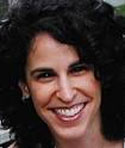
By Susan Dominus
7 November 2015
At 4:45 in the morning on a Saturday in early August, stars were still bright in the sky above a refugee settlement in rural Lebanon where Hana Abdullah, a 12-year-old girl from Syria, now lives. The morning call to prayer floated down a dusty road and wound its way around the mostly silent tents. At 5 o’clock, Hana was still sleeping on her bamboo mat by the edge of her family’s tent, her arms folded, her hands under her head. Her baby brother and three of her four sisters slept nearby. Many mornings Hana was up at 4 o’clock. She worked in the nearby fields of Lebanon’s Bekaa Valley, picking fruits or vegetables, and everyone started early. But today the truck that would take her there was late. Now came its familiar rumble, next the crunching of gravel: She stirred, her mouth twitched, her eyelids fluttered. Then she was up, vertical in one swift movement, stretching, pulling on a hat from a stash of her belongings. She grabbed lunch — a tomato, and a pita she folded around a potato — and ducked outside to wait on one of the benches in front of her tent.
Mustafa, Hana’s 10-year-old cousin, arrived moments later, along with his mother, Suraiya, who began tying the purple laces on his sneakers. He still wore the same green flannel pajamas he had worn for days; clothing was in short supply. Five minutes later, Hana’s 10-year-old cousin Ala’a arrived, prompting Hana’s first smile of the day. A small crowd quickly formed. Soon enough, the temperature would begin to soar, but now there was a chill in the air, and when people started moving toward the truck, Hana ran: She and Mustafa liked to sit with their backs against the cab, so the others would shelter them from the wind.
The Displaced
War has driven 30 million children from their homes. These are the stories of three of them.
Today they were picking cucumbers. Earlier in the season, which began in the spring, they picked almonds, a job Hana sometimes missed — at least the trees offered some shade from the sun. Then again, the almonds were stubborn, resisting her fingers. Almonds wanted to stay where they were, attached to the branches that were attached to the anchoring trunk.
Picking plums was not easy work, either. Hana found it tiring, making her way up the tree and then stretching and straining to reach some far branch, and then scrambling down so that she could look up and see what fruit she had missed. Down, up, down, up, down, up. Climbing trees was fun, but not 30 times a day in searing heat, with that Lebanese woman, that mean old maid, yelling at her every time she slowed down. Yalla, yalla, yalla! Let’s go, let’s go, let’s go! Sometimes girls saw black, fainted and were carried, limp, into a van and then driven to a nearby clinic. Thank God, Hana thought, never her.
At 5:45, they arrived at the cucumber field and spread out along the rows of vegetables. They would work there for the next five or six hours, until they went home for their midday break.
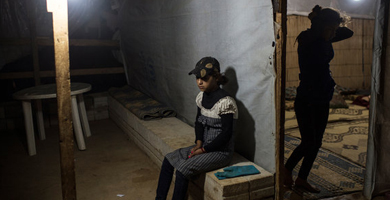
Photo: Hana waiting before dawn outside her family’s tent to go to work in nearby fields. Credit Lynsey Addario for The New York Times
Hana was a carrier. She walked up and down the rows of cucumbers, stopping at each picker who had a full bucket. The pickers dumped their vegetables into Hana’s crate, and then, when that was full — it sometimes weighed 20 pounds or more — she carried it on her bony shoulder, heading toward Suraiya, Mustafa’s mother, who sat at the edge of the field and sorted the cucumbers by size. Back and forth Hana went along a 50-yard path, zigzagging, sidestepping roots and cucumbers. In the early morning, with a frosty white moon still hanging in the pink sky, the walk to unload the cucumbers was not far. But with every trip, the temperature rose, the trek grew longer and Suraiya seemed to get smaller. By midmorning, Hana’s shoulder and back ached, and she was thirsty — there was never enough water. Time sometimes crawled at the settlement, but here, in the fields, its pace felt willfully slow, punishing. By 10:30 a.m., the temperature was high, and Hana was staggering ever so slightly, her breath loud.
Once, as Hana was picking plums and staring at a branch, she suddenly remembered that a tree on her family’s property back home in Syria had a swing. We could have one here, she thought — we could take one of these big buckets for carrying plums and attach it to a rope! We could take turns, maybe during a break — and then she jolted out of her daydream. “Idiot,” she told herself, “who’s going to let you have a swing here?” She went back to work, picking plums, counting the hours until she could return to a home that was really no home at all.
Hana came from Mabrouka, a small town in northeast Syria. She last saw her home three years ago, when she was 9 — so long ago, in the life of a girl her age, that she had forgotten as much as she remembered. From the fields where she picked cucumbers, she could see the mountains that divide Lebanon from Syria; a long drive past those mountains was her childhood home in the country. It was almost certainly rubble now, a pile of rocks burying all they left behind: Hana’s favorite doll, dressed like a queen, with long hair down to her waist; the crystal glasses the family rarely used; the proper mattresses; the flush toilet. Towels. Closets. She loved her childhood home, but if she could build a dream house now, it would have big gates, at least three, and only her fingerprint would open them. The locks would recognize only her voice when she called out, “Open, Sesame!”
It troubled Hana’s father, she knew, that her 5-year-old sister, Haifa, thought this was how they had always lived: in this makeshift settlement, in a tent of nylon and wood, alongside some 40 other tents, most of them inhabited by members of Hana’s extended family. In summer, they felt claustrophobic inside the airless homes; in winter, they worried about the roofs collapsing from the weight of the snow. Last winter, the children frequently scrambled up to clear the snow with their bare hands, waiting, all season long, for gloves that an aid agency had promised; by the time the gloves arrived, it was spring.
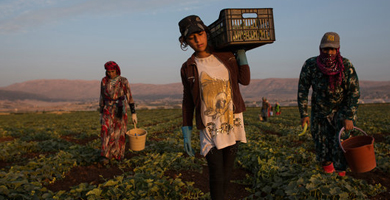
Photo: In the Bekaa Valley, many refugee children do farm work to help support their families. Credit Lynsey Addario for The New York Times
Haifa did not remember that they once had air conditioning, or a Chevy parked in front of the house, or childhoods of nothing but play and school. Why, Hana often wondered, had she not appreciated school back in Syria? In Mabrouka, Hana never had to miss school to work — she never worked at all, although sometimes, her dad would give his children some loose change if they brought him a cold drink.
They left that life in the spring of 2012. Hana said she understood little about the political situation that kept her far from home. The protest movement started in Syria in 2011, with the uprising of citizens opposing President Bashar al-Assad’s oppressive government. By the following year, occupied with the uprising elsewhere, Assad’s security forces started withdrawing from rural pockets of Hasaka, the province where Hana’s family lived, and parts of the area quickly felt unsafe: Roaming armed gangs, whose loyalties were not always clear, were extorting farmers, like Hana’s father, for the right to farm their own land. Hana’s family began to hear about clashes between the Sunni Arab opposition and the government. Hana’s father, who had already started working in Lebanon to make extra money, told her mother it was time for them to leave. Hana wanted to bring all her toys, all her dolls, but her mother told her no, there would be toys where they were going. Hana and her siblings had visited their father in Lebanon before, and she did not realize she would probably never return to that house again.
They left for Lebanon by bus. When they reached the border, traffic was at a standstill. Many of the people left their cars, playing cards and picnicking by the side of the road. Her family did the same, relaxing and stretching their legs. Hana heard gunshots; maybe some soldiers near the border were doing some drills, she thought. The mood was almost festive — she was going to see her father soon, for the first time in months. She thought she should look nice for him, so she ran to the bus to find her comb. From the bus, she heard more gunshots and looked outside. She remembers seeing men firing back and forth with Syrian soldiers. Then suddenly she was in the bus driver’s arms, and he was running, carrying her away from the bus with its full tank of gas. Outside, bullets were flying, and before she understood what was happening, she was climbing into a giant cement pipe along with two of her siblings and her mother, all of them cramped in the dark, unable to move, everyone howling or sobbing. “It would have been better to die in our home than die like this,” she screamed at her mother. “Why did you bring us here?”
They ran to an abandoned building to wait out the shooting; how long it lasted, she could not say. Eventually they got back on the bus. That day, her life as a refugee began. She entered a new world, and she never stopped wishing she could return to the old one.
Everyone at the settlement had known that kind of terror. “Please don’t tell me your story,” she would say to her friends, “because if you do, it will make me think of what happened to me.” And then she would tell them exactly what had happened to her. Whenever a disturbing news story about Syria played on a television they had in the tent, the children cried. Hana, too — not so much because they were all disturbed by the latest horror, she thought, but because they were reliving their own.
One of her favorite cousins at the settlement was Abboudi, who was also 12. One day, when he was still living in Syria, militia fighters in masks — presumably extremists in the opposition — walked into his school pulling a Syrian Army soldier. The men in masks forced the students to form a circle in the courtyard. They stood behind the students to make sure they could not run away. Then they shot the man in the back of the head, and cut his head off, to send a message to anyone sympathetic to the government. For Abboudi, that was the end of his childhood as he knew it. He never returned to school in Syria, and several months later, his family joined Hana’s at the settlement.
Hana felt particularly protective toward her cousin Marah, Mustafa’s sister, who was 13 and had been one of her closest playmates back in Mabrouka. Marah’s school, too, had been overrun by men in masks with guns. Now the field labor, for her, was its own kind of trial. It was tough for everyone, but somehow, especially so for Marah. She could not withstand the sun, the physical work itself, the yelling from the supervisor. Hana would throw her arm around Marah on the bumpy truck, as they headed out to the fields, holding her as she would a much smaller child.
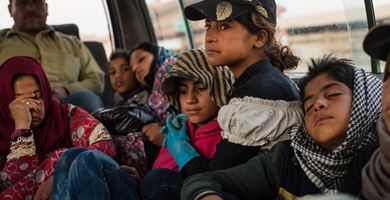
Photo:Hana holding her cousin Marah as they make the bumpy ride to work in a plum orchard. Credit Lynsey Addario for The New York Times
In Syria, Marah’s father was the one who owned the land, who employed the workers — dozens of them. Now her father was gaunt from tuberculosis, and had nothing; now they were the workers, Marah and her mother and her brother. The supervisor yelled at them — cursed at them! Blasphemed at them! — if he thought they were not working hard enough. Marah had succumbed to sunstroke three times already, woozy, nauseated, close to collapse. When her mother took her to the clinic, even the doctor insulted them, lecturing her mother about sending her daughter off to do child labor. Suraiya, poised and elegant, showed no rage but simply explained that without the money Marah made at work, the family would not have enough to eat through the winter.
For a long time, it seemed to Marah that they should just go back to Syria. They would not have to join one side or another — they could just go back to their big house with the sunny eat-in kitchen and its comfortable couch and stay there, quietly. They would not bother anyone, and no one would curse at them and all would be well. Finally, she asked her mother why they could not just do so. “Because they will do worse than yell at us,” Suraiya told her. “They will cut off our heads.” Marah never asked to go back to Syria again.
There are currently estimated to be 30 million children who have been displaced by war — children longing for home, or too terrified to think of home, or trying to forget home and settle somewhere new.
More than from any other country, they come from Syria: Since the war started in 2011, more than four million Syrians have fled the country, at least half of whom are thought to be children. What started as a protest movement had become, by 2013, a full-blown civil war, with various opposition and extremist groups fighting one another as well as the government. Recently violence has spiked along with poverty in Syria; Lebanon, Turkey and Jordan have also tightened their borders, which has compelled more and more Syrians to make the treacherous journey to Western Europe.
But the vast majority of Syrian refugee children — some two million, according to a United Nations High Commissioner for Refugees estimate — have already settled in those nearby countries. There, they endure, with their families, the slow grind of lives in limbo. In Turkey and Jordan, the U.N.H.C.R. or the local government has built sprawling refugee camps; Lebanon has not allowed or built these camps, for fear of creating a permanent Syrian population in this small country (already, at least one million Syrian refugees have arrived in Lebanon, a country of four and a half million). So vulnerable families build haphazard housing, tents that clutter fields by the side of the road, or squat in abandoned buildings. In Lebanon’s cities, the more desperate Syrian children sell paper flowers and beg in the streets long into the night.
Unlike the children en route to Europe, or arriving in Europe, Hana and those like her suffer through a waiting game. Hana seems sustained by an ever-waning sense of hope that she can eventually go home to recapture some of what has been lost, while knowing all the while that already, so early in her life, so much is gone for good.
Inside the settlement, Hana was someone. She was a hand-on-hip kind of girl, the kind whom other children naturally let mediate their disputes. She pierced girls’ ears — only she had the stomach for it — and when she finished her own work in the field, she rushed to help Ala’a and Ala’a’s twin sister, Wala’a, so they, too, could have a break.
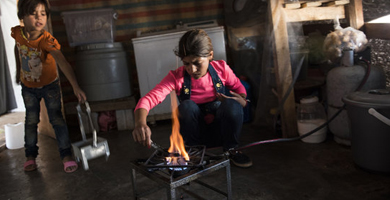
Photo: Hana prepares coals for an Arabic water pipe for her father and his guests in the kitchen of the family tent. Credit Lynsey Addario for The New York Times.
Her father was someone there, too: the shawish, a leader and the middleman who arranged for his extended family to find work in the fields. Her uncles were the pillars of their communities back in Syria: a high-school principal, the town mayor. Outside the settlement, that meant nothing. “ISIS scum,” a Lebanese man once spat at her father. This was as baffling as it was enraging, since no one hated ISIS more than they all did. Before they moved to the settlement, they lived in two others: Each was set aflame — most likely, she had been told, by Lebanese who did not want them there.
It is illegal for the Syrian refugees to work in Lebanon, which meant the supervisors could treat them badly — sometimes they didn’t pay them after they worked long days. One afternoon, Ala’a and Wala’a came back from picking chickpeas looking wild-eyed. The supervisor who was renting the land had been furious with the group, ostensibly for asking for cold water, but most likely because he realized he had waited too long to harvest his chickpeas, and now they were useless. In a fury, he set fire to a pile of crates, threatening to burn the field along with everyone in it. Usually, Hana hoped to work with Ala’a and Wala’a, but she was glad she had not been there that day.
If Hana was afraid of the supervisors, she never let on. She described herself as “strong of heart,” which is why she was the one, on one of the hottest days, to ask for more water on behalf of the group. “What are you, stupid?” the supervisor barked at her. “I don’t have time to go to the store and back to get you more water.” But she would not be humiliated. She kept working, stone-faced.
The work had gotten easier over time, which was not to say it was ever easy. “It’s better than begging for bread,” Suraiya said. The aid each person received from the World Food Program had dwindled to $14 a month — even Hana knew that was not enough for the families to get by, especially in Lebanon, where prices were high. (The W.F.P. has recently raised the allotment to $21.) So the children worked and the mothers worked. Some of the fathers worked in the field, too — but the Lebanese supervisors, Hana’s father said, preferred to hire children and mothers, who were cheaper, and easier to boss around.
“If you’ve lost your gold, you can find it in the jewelry shop,” the mother of one of Hana’s friends sometimes sang, as she picked cucumbers. “If you lose a child, you might forget. But if you lose your country, how will you find your country?” It was a song from Iraq, an Iraqi refugee’s lament, but it played constantly on the radio stations Syrians listened to. Everyone knew the words.
One long day in the plum arbors, the supervisor told the group of workers from the settlement that each person needed to fill 30 crates with plums. So Hana worked hard and fast to finish, only to be told she needed to fill another 10. Then it was another 10. Ten more. Then it was five. Finally, for the first and only time at work, Hana lost control: “I can’t fill any more crates!” she screamed. As soon as she did, she said, she felt frightened: How would the supervisor react? The supervisor stared at her, furious. Hana got hold of herself; she spoke to the supervisor with some command of her own. “Just tell me, honestly,” Hana said to her. “How many more crates?” She could take almost anything if only she knew: How much more?
Home from the cucumber fields one afternoon this summer, Hana washed her face and guzzled a large bottle of water. Her father worried about the water. He said it had been tested and found contaminated: Two or three people at a time were always sick at the settlement, but no one ever knew whether it was from sunstroke or bad water. But it was all they had; water shortages were already a problem in Lebanon before its population exploded with the start of the Syrian war.
Sometimes, when Hana thought about her hometown, she could remember almost nothing. Sometimes she would have flashes of memory — sun, warmth, flowers: the flowers outside her home, bright and pink like the notebook in front of her. “Don’t pick a flower,” her mother used to scold her. “Every one of them is a living thing.” Once, the teacher had wiped down the desks with a lemon-scented cleanser, and suddenly Hana was back home, safe, once again: Her mother was watering a lemon tree with a hose, and the entire house was awash with the fresh smell of citrus.
It was hard to imagine that those flowers would still be growing there, that the lemon tree was even still alive. When Hana pictured Syria lately, she pictured dead bodies. Kurds had liberated Mabrouka from ISIS fighters in May; but they had a grim job ahead of them in cleaning up the rubble. And, in some cities, the bodies. So that was another reason she worked: To help her parents send money back home. To pay the people who would take away the bodies, all the dead bodies.
In class, she was drifting. She wanted to be in school, but when she was there, she often went blank, propping up her head on her hand, bone-tired. She also had a loose, loud cough she could not shake, so bad she sometimes had to leave the classroom.
Wait — this was interesting. The teacher was talking about how a piece of bread gets made, starting with the wheat. Whenever Hana was sent to the cucumber fields, the route also took her past fields holding wheat wrapped in white plastic, looking like oversize pillows. Hana might have imagined what the wheat workers looked like — people like her and her family, bent over, their heads covered, their movements slowing as the day wore on. “A lot of people get tired so we can eat that piece of bread,” she said suddenly to the teacher. The teacher smiled and looked sad at the same time. Hana loved her teacher.
But sometimes Hana thought her teacher did not understand who she was — that she was not a little girl, or a fragile flower, not anymore. Once Hana and her friend Bara’a were in a bitter fight. The teacher took Hana aside to ask if she could help them work it out. “Look, I like you a lot,” Hana told her. “We can be friends. But this is none of your business.”
In school, Hana’s teacher talked about agriculture, what seeds needed: sunlight, water and care, in order to grow to be healthy and fruitful. They were like humans that way, she said. They needed tending.
Who would Hana grow up to be? Her father never looked more discouraged than when he talked about Hana’s prospects. “Yes, she is smart,” he said one afternoon, sitting on a bench outside his tent, his shoulders slumped. “But what good will it do her?” He waved out toward the settlement, gesturing vaguely toward its inhabitants. “It’s a lost generation.” He worried about the future of the individual children living there, and he worried about their collective ability to take on the challenge of transforming Syria after the war. “How will they rebuild our country?”
When Hana thought about the future, no clear image emerged: She found it too painful to try to hope for a return to life in Syria. But she did not think much about her future in Lebanon, either.
Her cousin Khitam, a 14-year-old beauty, had been the strongest student in class back home, with every intention of going to college, with the support of her family. But now, her parents settled for something secure for her. She was married off to Hana’s brother Ibrahim, a skinny young man, also 14, with faint stubble on his chin. Once married, most girls in refugee camps stopped attending school — they could be mothers soon enough. Often, now, Khitam seemed to be looking downward; she walked slowly. The first week in August, she was sick, lying on a mat and staring blankly for hours at a time.
Hana liked to imagine that she might become a doctor one day, but if her family remained in the settlement for another few years, it seemed very likely that she, too, would be married there, maybe even raise children there, instead of dreaming of college or medical school. Her childhood was in a desperate, losing race with the war: Which would be finished first?
Tantalizingly close to the settlement was a public pool and playground, with swings and ice cream. Hana had been there only once, a few months earlier, with her father, and was stunned to find heaven so close to her home. When they first arrived at the pool, Hana, eager to jump in, had started to strip off her shirt, with nothing beneath it, until her father stopped her. She was 12 now, too old for that, but she had forgotten: In some ways, she was still the young girl she was back in Syria, as if she were waiting for her childhood to resume where it had left off.
The August heat, which was making a misery of their labors in the field, suddenly turned into a boon: Almost no one would work that afternoon or the next, for fear of mass sunstroke. The children could go to the pool, a first for most of them. The day was a flash of bliss. Hana stayed in the shallow end, afraid to try swimming in the deeper water — she had never had the chance to learn the right strokes. Mustafa hogged an inflatable tube shaped like a duck, Hana stood on her cousins’ shoulders like an aquatic gymnast and Khitam felt so relaxed that she took off her head scarf. The young women swam in their full clothing, for modesty’s sake, but none of them owned bathing suits or towels anyway. None of it mattered. They left with the sun low in the sky. “This was the best day of my life,” Ala’a and Wala’a’s older sister Foda said.
But the next day, when the children arrived at the pool, they had to wait outside the gate until their parents could come to supervise them in the water. Hana and her friends, their fully clothed bodies pressed up against the fence, looked in at the park. Hana suddenly imagined what the Lebanese people in the pool, looking out at them, thought they were seeing: pathetic refugees who could not even afford to pay. The night before, one of Hana’s friends told her that she had overheard a Lebanese man at the pool say, “Look at those Syrians, it’s like they’ve never been in a pool before,” as he took pictures of them with his iPhone. “Curse your father,” a Lebanese teenager snapped at one of them. A child from the settlement was excited that a Lebanese family had given him a castoff, ripped inflatable ball.
Now Hana broke away from the group huddled at the fence, her face furious. “Forget it,” she said. “Let’s just go back. I want to go back.” The Lebanese would think they were just envious onlookers, interlopers. They were outsiders. She started making her way toward the driveway, where the cars with their parents would soon be arriving. Hana, strong of heart, started to cry.
The day before, Hana had been a child at the pool; today, she was an adolescent, all too aware of the reality of her situation, exquisitely sensitive to her family’s precipitous drop in status. She knew how some Lebanese saw her family — as leeches, or ignorant, or worse, ISIS scum. She was incapable of proving them wrong, and incapable of changing her circumstances: Not yet adult, she was among the most powerless of the powerless group of refugees her family had joined.
Finally, a car from the settlement showed up. Here was her soft-spoken mother, her smart father, their friend Suraiya, people whom she knew and who knew her. The storm passed. She threw her shoulders back as she marched toward the gate. She would go to the pool after all. The Lebanese would have to share the space, make their peace with their presence. They were not going anywhere soon. Maybe today, she would try to swim.
Susan Dominus is a staff writer for the magazine. She last wrote about two pairs of identical twins in Colombia who were mixed up at the hospital and raised as two pairs of fraternal twins.
Lynsey Addario is an award-winning photojournalist who has covered conflicts in Afghanistan, Iraq, Libya, Lebanon, Darfur, South Sudan and Congo.
Source: goo.gl/e7ZT7G

No comments:
Post a Comment